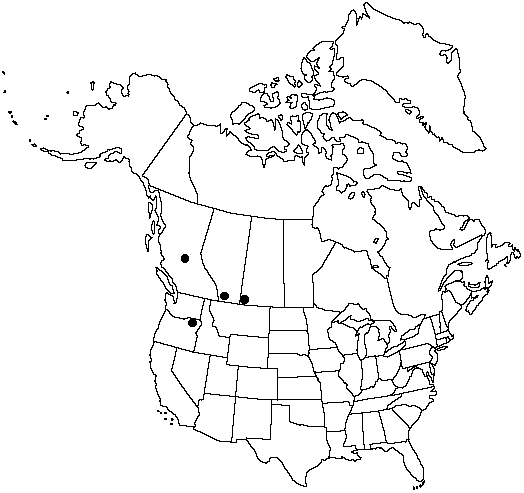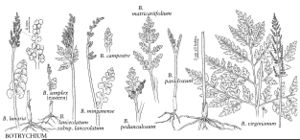Difference between revisions of "Botrychium pedunculosum"
Amer. Fern J. 76: 43, figs. 2, 7. 1986.
FNA>Volume Importer |
FNA>Volume Importer |
||
| Line 17: | Line 17: | ||
}}<!-- | }}<!-- | ||
| − | --><span class="statement" id="st- | + | --><span class="statement" id="st-undefined" data-properties=""><b>Trophophore </b>stalk 8–26 mm, to 1.1 times length of trophophore rachis; blade dull green, ovate-oblong to deltate-oblong, 1-pinnate, to 4.5 × 2 cm, leathery. <b>Pinnae</b> to 5 pairs, somewhat ascending, approximate to well separated, distance between 1st and 2d pinnae not or slightly more than between 2d and 3d pairs, basal pinna pair approximately equal in size and cutting to adjacent pair, ovate-rhombic to spatulate, lobed to tip, margin entire to irregularly lobed, apex rounded to acute, venation pinnate. <b>Sporophores</b> 1–3-pinnate, 2–4 times length of trophophore. <b>2n</b> =180.</span><!-- |
-->{{Treatment/Body | -->{{Treatment/Body | ||
| + | |phenology=Leaves appearing in late spring, dying in early fall. | ||
|habitat=Brushy secondary-growth habitats along streams and roadsides | |habitat=Brushy secondary-growth habitats along streams and roadsides | ||
|elevation=300–1000 m | |elevation=300–1000 m | ||
| Line 41: | Line 42: | ||
|basionyms= | |basionyms= | ||
|family=Ophioglossaceae | |family=Ophioglossaceae | ||
| + | |phenology=Leaves appearing in late spring, dying in early fall. | ||
|habitat=Brushy secondary-growth habitats along streams and roadsides | |habitat=Brushy secondary-growth habitats along streams and roadsides | ||
|elevation=300–1000 m | |elevation=300–1000 m | ||
| Line 48: | Line 50: | ||
|publication year=1986 | |publication year=1986 | ||
|special status= | |special status= | ||
| − | |source xml=https://jpend@bitbucket.org/aafc-mbb/fna- | + | |source xml=https://jpend@bitbucket.org/aafc-mbb/fna-data-curation.git/src/9216fc802291cd3df363fd52122300479582ede7/coarse_grained_fna_xml/V2/V2_702.xml |
|genus=Botrychium | |genus=Botrychium | ||
|subgenus=Botrychium subg. Botrychium | |subgenus=Botrychium subg. Botrychium | ||
|species=Botrychium pedunculosum | |species=Botrychium pedunculosum | ||
| − | |||
| − | |||
| − | |||
| − | |||
| − | |||
| − | |||
| − | |||
| − | |||
| − | |||
| − | |||
| − | |||
| − | |||
| − | |||
| − | |||
| − | |||
| − | |||
| − | |||
| − | |||
| − | |||
| − | |||
| − | |||
| − | |||
}}<!-- | }}<!-- | ||
-->[[Category:Treatment]][[Category:Botrychium subg. Botrychium]] | -->[[Category:Treatment]][[Category:Botrychium subg. Botrychium]] | ||
Revision as of 13:26, 27 July 2019
Trophophore stalk 8–26 mm, to 1.1 times length of trophophore rachis; blade dull green, ovate-oblong to deltate-oblong, 1-pinnate, to 4.5 × 2 cm, leathery. Pinnae to 5 pairs, somewhat ascending, approximate to well separated, distance between 1st and 2d pinnae not or slightly more than between 2d and 3d pairs, basal pinna pair approximately equal in size and cutting to adjacent pair, ovate-rhombic to spatulate, lobed to tip, margin entire to irregularly lobed, apex rounded to acute, venation pinnate. Sporophores 1–3-pinnate, 2–4 times length of trophophore. 2n =180.
Phenology: Leaves appearing in late spring, dying in early fall.
Habitat: Brushy secondary-growth habitats along streams and roadsides
Elevation: 300–1000 m
Distribution

Alta., B.C., Sask., Oreg.
Discussion
The common stalk on this species tends to be reddish brown. The presence of extra sporangia on the proximal pinnae is known only in Botrychium pedunculosum and B. ascendens.
Botrychium pedunculosum grows with other moonworts, B. lanceolatum, B. lunaria, B. minganense, and B. pinnatum. It has not been found in association with the rather similar and much more common B. hesperium.
Of conservation concern.
Selected References
None.
